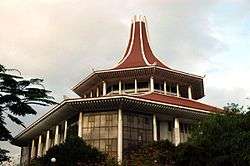Edward Shepherd Creasy
Sir Edward Shepherd Creasy (12 September 1812 – 17 January 1878) was an English historian and jurist.
Life
He was born in Bexley, England. He was educated at Eton College (where he won the Newcastle Scholarship in 1831) and King's College, Cambridge and called to the Bar in 1837.[1] In 1840, he began teaching history at the University of London.
Creasy was knighted in 1860, and assumed the position of Chief Justice of Ceylon in 1875. He returned to England and died in London on 17 January 1878.
Works
Creasy's best known contribution to literature is his Fifteen Decisive Battles of the World (1851). It is typical of 19th century European sentiment, with references to the barbarism and immorality of non-Europeans. The reason Creasy gives for the significance of many of the fifteen battles, is that they denied Eastern peoples access to European soil. Other battles are seen as "decisive" because they shaped the development of Britain, which was the world's leading power at the time of writing.
Other works included are:
- Biographies of Eminent Etonians (1850, several editions)[2]
- Historical and Critical Account of the Several Invasions of England (1852);[2]
- History of the Ottoman Turks;[2]
- History of England, 1869–70, in 2 vols.[2]
- The Rise and Progress of the English Constitution; and
- Imperial and Colonial Institutions of the British Empire (1872).[2]
Old Love and the New (1870) was a novel. With John Sheehan and Robert Gordon Latham, Creasy took part in contributing to Bentley's Miscellany the political squibs in verse known as the Tipperary Papers.[2]
References
- ↑ "Creasy, Edward Shepherd (CRSY831ES)". A Cambridge Alumni Database. University of Cambridge.
- 1 2 3 4 5 6
 Stephen, Leslie, ed. (1888). "Creasy, Edward Shepherd". Dictionary of National Biography. 13. London: Smith, Elder & Co.
Stephen, Leslie, ed. (1888). "Creasy, Edward Shepherd". Dictionary of National Biography. 13. London: Smith, Elder & Co.
- Attribution
 This article incorporates text from a publication now in the public domain: Stephen, Leslie, ed. (1888). "Creasy, Edward Shepherd". Dictionary of National Biography. 13. London: Smith, Elder & Co.
This article incorporates text from a publication now in the public domain: Stephen, Leslie, ed. (1888). "Creasy, Edward Shepherd". Dictionary of National Biography. 13. London: Smith, Elder & Co.
External links
- Works by Edward Shepherd Creasy at Project Gutenberg
- Works by or about Edward Shepherd Creasy at Internet Archive
- Works by Edward Shepherd Creasy at LibriVox (public domain audiobooks)

![]() This article incorporates text from a publication now in the public domain: Cousin, John William (1910). A Short Biographical Dictionary of English Literature. London: J. M. Dent & Sons. Wikisource
This article incorporates text from a publication now in the public domain: Cousin, John William (1910). A Short Biographical Dictionary of English Literature. London: J. M. Dent & Sons. Wikisource
